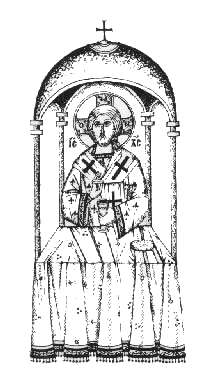Acquiring an Orthodox Mindset: The Divine Services
The absence of a patristic phronema in Orthodox Christians today is also reflected in the area of liturgics. Though the underlying problem is the same—a lack of sensitivity and fidelity to the catholic consciousness of the Orthodox Church—, the symptoms are different. While an un-Orthodox approach to the dogmas and holy Canons of the Church may manifest itself in aberrant ecumenical activities and heretical "joint agreements," the same ill mindset when applied to the Divine services results in what has been appropriately labeled "renovationism." A comparative overview should help to both illustrate and summarize the traditional point of view that will be presented in the articles that follow:
| Traditional | "Renovationist" |
|---|---|
| The Church's system of liturgical services (i.e., the Typicon) is the divinely inspired mature growth of the Apostolic embryo. The full flower of God's revelation to His people—as embodied in the Divine services—organically emanated from the seed of the early Church. | The Typicon as we know it today has become somewhat unintelligible and tremendously cumbersome; for it is encrusted with layers of extraneous and repetitive material that reflect a significant shift away from, and degeneration of, the worship forms of the early Church. |
| We should have faith in Divine Providence and that the same Spirit who "guides us into all truth" also ordains the Church's order of worship (see quote by Fr. Michael Pomazansky, below). | The liturgical services mainly represent the product of a "naked chain of events," or historical cause and effect. The Holy Spirit does not ensure that our rites are kept pristine. |
| The fourth century (in the wake of the "Peace of Constantine") saw a Spirit-guided organic development in the Divine services, as confirmed by the witness of the Church's consciousness in the following centuries up through our present day. | The fourth century saw a "break," or "abrupt shift" in the system of services resulting in "deviations" from the purity of the Apostolic era due to the overlaying of Hellenistic "strata" and the synthesis of new and conflicting "liturgical pieties." |
| Our Task: to understand and grasp this revelation of God to His people as contained in the Divine services. This requires humility and ascetic struggle with a view towards purifying our hearts. | Our Task: to figure out what has gone wrong with our liturgical services and "fix the many problems" with them. This requires a spirit of doubt and suspicion, as well as heavy reliance upon Western scholarship. |
Key Related Articles

The Liturgical Theology of Fr. A. Schmemann, by Fr. Michael Pomazansky. This classic article focuses on the answer to one main question: "Has the author [Fr. Alexander] indeed escaped Western captivity" in his thesis that the Church's understanding of Her Divine services needs to be recovered through the use of "historico-liturgical research"? Fr. Michael exposes the influences of modern Western scholarship and lack of fidelity to the mind of the Church in Fr. Alexander's whole approach to liturgics, an approach that has greatly infiltrated the minds of Orthodox people in the West today. See related comments in Father Thomas Hopko on BEM.
Three Byzantine Commentaries on the Divine Liturgy: A Comparative Treatment, by Bishop Auxentios of Photiki and Fr. James Thornton. This is Ch. 2 from Essays on Four Orthodox Liturgical Issues: A Collection of Liturgical Commentaries Written from a Traditionalist Orthodox Perspective (Etna, CA: Center for Traditionalist Orthodox Studies, 1996).
"Fear and Trembling" Language in Fourth- and Fifth-Century Liturgical Texts: From Bishop to Schmemann to a Corrected View, by Bishop Auxentios. Ch. 3 from Essays on Four Orthodox Liturgical Issues.
Comments on the Late Fathers Alexander Schmemann and John Meyendorff: A Reply to Mr. Ognian Rangachev, by Bishop [now Archbishop] Chrysostomos of Etna (Orthodox Tradition, Vol. XII, No. 4.)
Pouring Water on Acid: The Sad Consequences of Spiritual Ignorance, by Bishop [now Archbishop] Chrysostomos of Etna. This is an important article on liturgical revisionism as a symptom of spiritual ignorance.
Liturgical Renewal: an Orthodox Tradition Q&A.
"If we confess that we stand on the right dogmatic path, we should not doubt that the direction of Church life and the structure of worship which was erected on the foundation of our Orthodox confession of faith, are faultless and true.... We are convinced that our public prayer is based on the very same dogmatic and psychological foundations on which it was made in Apostolic and ancient Christian times, notwithstanding the difference in forms of worship."
Fr. Michael Pomazansky, "The Liturgical Theology of Fr. A. Schmemann" in Selected Essays (Jordanville, NY: Holy Trinity Monastery, 1996), p. 102.
"...[W]ithin Orthodox theological thought there operates a certain principle of commonality of belief. What has stood the test of time persists in the corpus of Orthodox literature because it belongs to that which is accepted into the consciousness of the Church, the phronema ton pateron, the "mind" of the Fathers, that "golden thread," as Father Florovsky calls it, that unites the Orthodox Fathers of today with their predecessors in the past in a oneness of thought and faith."
Bishop Auxentios and Father James Thornton,
"Three Byzantine Commentaries on the Divine Liturgy," ibid.,
p. 53.

